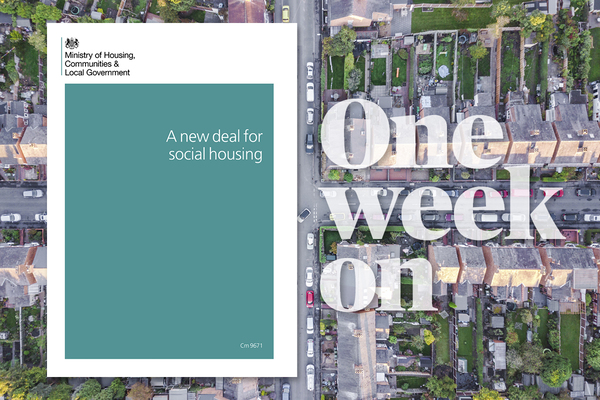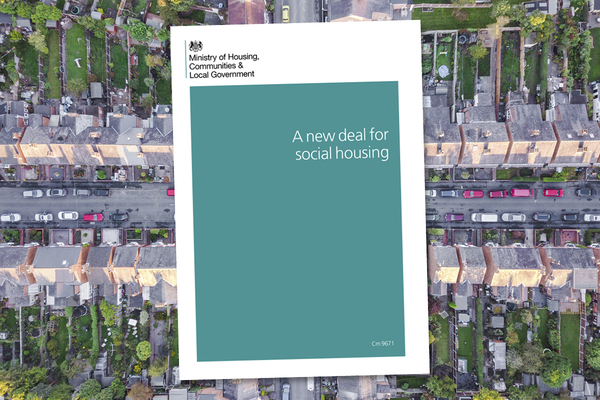You are viewing 1 of your 1 free articles
Funding for early intervention
Reducing pressure on public services requires the provision of new housing with support, says Dame Clare Tickell
This August saw a long-awaited announcement on the future funding of supported and sheltered housing, closely followed by a consultation on rough sleeping, followed by the much-trailed Social Housing Green Paper.
This year marks not only the 70th anniversary of the NHS, but also the United Nations’ Universal Declaration of Human Rights. Article 25 highlights the right to “a standard of living adequate for health and well-being, including the right to housing, medical care and necessary social services”.
As context to this summer’s announcements, this is very powerful – not least because of the implicit, enduring recognition of the interdependencies between housing and access to other support services.
The conclusion of the review on funding for supported and sheltered housing is the only sensible one, and the government is to be commended for finally getting to the right answer.
Namely, that the existing arrangements are the least worst and, while some tidying up should be done, the alternatives are wholly unpalatable.
The most cost-effective way of reducing pressure on expensive public services is to invest in early intervention, helping people by providing decent affordable housing, appropriate support and well-being services so they can live as independently as possible for as long as possible.
Not only is this empowering, helping to create engaged communities and citizens, it reduces avoidable spending on costly late interventions so that taxpayers’ money is spent in the right places.
The rub, of course, is that the earlier the intervention, the less visible the impact: a hospital bed that wasn’t needed, a family that was not evicted, a mental health section was avoided, a young person not homeless etc.
Furthermore, proving a negative is notoriously hard, particularly when finances are tight and hatches battened down.
Compounding this difficulty is that life, and people, are not predictable. Just as Universal Credit has struggled to be flexible, compassionate and nimble enough for real people and their lives, the same complexity makes it difficult to design a neat funding system for supported and sheltered housing.
"As local authority budgets have reduced, Supporting People budgets have virtually disappeared, and the cost of this has largely been transferred to housing benefit."
As if this wasn’t enough, these are cross-cutting issues impacting different departments, and as one manages to contain or reduce their contribution, it moves to another. This is because the need and the demand haven’t gone away. As local authority budgets have reduced, Supporting People budgets have virtually disappeared, and the cost of this has largely been transferred to housing benefit. Supporting People was, of course, the outcome of the last review when government sought to shift control and responsibility to local government. Plus ça change.
There are two reasons this history is important. The first is corporate memory.
We have collectively spent nearly three years on pause while this has been working itself through. Developments have slowed down, plans put on hold and customers made anxious.
The issues and stickiness were not significantly different from when Supporting People was introduced. History does not need to repeat itself so predictably. At the very least, learning must now be captured from previous reviews.
The second, linked reason is that demand for care is increasing. People are living longer; homelessness, mental ill health and substance misuse are increasing and the pressure on acute public services is growing.
There needs to be recognition of the need for urgent funding for early intervention services, so as to enable people to live in relative independence with the support they need in well-designed housing, and that this is both cost-effective and desirable. Alongside this, we also need to give some thought to how this effectiveness can be measured in terms of outcomes.
“There is much to be welcomed in the new Social Housing Green Paper, at least in terms of policy intent.”
Underpinning this, there is much to be welcomed in the new Social Housing Green Paper, at least in terms of policy intent. But without specificity on the sources of new money and, in particular, recognition of the need to build more housing for rent in areas where demand massively outstrips supply and affordability, it falls short.
Supported and sheltered housing are vital for people with multiple and sometimes complex needs, and it is largely rented. Demand for this is likely to increase. Alongside standalone provision, large-scale regeneration or new developments at scale can accommodate specialist housing well and encourage community engagement with demonstrable benefits.
These are ‘wicked issues’. The thing about wicked issues, though, is that for those who persevere with them, the rewards are great.
Let’s hope that the courage that understood the need to move away from wholesale reform of the messy but workable funding for supported and sheltered housing can be sustained and applied more widely, so as to enable the provision of much-needed new housing with support. With some money to build, we would then be motoring.
Dame Clare Tickell, chief executive, Hanover Housing











